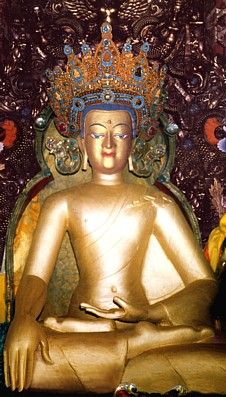Jowo Shakyamuni: Difference between revisions
Jump to navigation
Jump to search
(Tibetan.) |
No edit summary |
||
| Line 4: | Line 4: | ||
==History== | ==History== | ||
Believed to have been crafted during the Buddha's life by the celestial artist, Vishvakarman with the guidance of the god [[Indra]], the Jowo Shakyamuni statue originally belonged to the king of [[Magadha]] who gave it to the king of the Tang empire in China. His daughter, [[Wencheng]] Kongjo, brought it to Tibet in her dowry when she married King [[Songtsen Gampo]]. | Believed to have been crafted during the Buddha's life by the celestial artist, Vishvakarman with the guidance of the god [[Indra]], the Jowo Shakyamuni statue originally belonged to the king of [[Magadha]] who gave it to the king of the Tang empire in China. His daughter, [[Wencheng]] Kongjo, brought it to Tibet in her dowry when she married King [[Songtsen Gampo]]. | ||
==Further Reading== | |||
*Cameron Warner, ''Re/crowning the Jowo Śākyamuni: Texts, Photographs, and Memories'', History of Religions, Vol 51, The University of Chicago Press | |||
==Internal Links== | ==Internal Links== | ||
Latest revision as of 14:34, 16 February 2022

Jowo Shakyamuni aka Jowo Rinpoche (Tib. ཇོ་བོ་རིན་པོ་ཆེ་, Wyl. jo bo rin po che) — the most sacred image in Tibet, representing Buddha Shakyamuni, housed in the Jokhang temple in Lhasa.
History
Believed to have been crafted during the Buddha's life by the celestial artist, Vishvakarman with the guidance of the god Indra, the Jowo Shakyamuni statue originally belonged to the king of Magadha who gave it to the king of the Tang empire in China. His daughter, Wencheng Kongjo, brought it to Tibet in her dowry when she married King Songtsen Gampo.
Further Reading
- Cameron Warner, Re/crowning the Jowo Śākyamuni: Texts, Photographs, and Memories, History of Religions, Vol 51, The University of Chicago Press